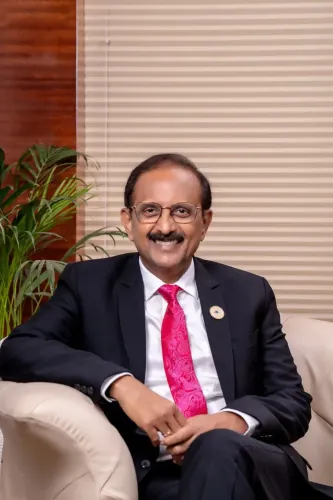How will GST reforms improve the affordability of life-saving drugs and public health?

Synopsis
Key Takeaways
- GST reforms simplify tax structure.
- Lower rates for life-saving drugs enhance affordability.
- Medical devices benefit from reduced GST.
- Health insurance premiums now have nil GST.
- Government aims to bolster domestic manufacturing.
New Delhi, Sep 3 (NationPress) The recent Goods and Services Tax (GST) reforms introduced by the GST Council during its 56th meeting will significantly enhance the affordability of essential medications and tackle public health challenges, according to pharmaceutical experts.
In a groundbreaking decision, the GST Council, led by Finance Minister Nirmala Sitharaman, has streamlined the indirect tax framework by reducing the current four tax slabs to two, eliminating the 12% and 28% rates while keeping the 5% and 18% rates intact.
Under this revision, life-saving medicines, health-related products, and certain medical devices will experience a reduction in tax rates from 12% or 18% to either 5% or zero.
The revised GST rates on services will take effect starting September 22.
According to Sudarshan Jain, Secretary General of the Indian Pharmaceutical Alliance (IPA), the Prime Minister's initiative for next-generation GST reforms is crucial for promoting growth. He emphasized that categorizing medicines under the 5% slab is essential for enhancing affordability and addressing urgent public health issues.
He also pointed out that the pharmaceutical sector has suggested aligning GST rates for Active Pharmaceutical Ingredients (APIs), Key Starting Materials (KSMs), and other critical inputs to 5%. This alignment aims to prevent tax inversion, enhance working capital, fortify domestic manufacturing, and elevate India's status as the 'pharmacy of the world.'
The Association of Indian Medical Device Industry (AiMeD) has also expressed its approval of the government's decision to reduce GST rates from 12% to 5%.
Rajiv Nath, Co-Ordinator of the AiMeD Forum, expressed hope that refunds on the accumulated GST due to the inverted GST structure will be processed within seven days. He mentioned that they also expect GST refunds on services and capital goods, similar to practices in countries like Australia, Singapore, and Canada, to remain competitive on a global scale.
He added, 'We also seek a transition period to switch packaging materials to avoid penalties for profiteering, although we plan to pass on the GST savings to consumers by lowering the MRP proportionately.'
Additionally, the government has eliminated GST on individual health and life insurance premiums, which previously stood at 18%. The Finance Minister stated that this measure will make insurance more accessible to the general public and contribute to broader coverage across the nation.
With this adjustment, all individual life insurance policies—including term life, Unit Linked Insurance Plans (ULIPs), and endowment plans—along with their reinsurance, will now fall under the zero GST category. This exemption extends to all individual health insurance policies, including family floater and senior citizen plans, along with their reinsurance.










